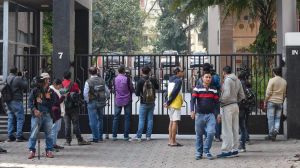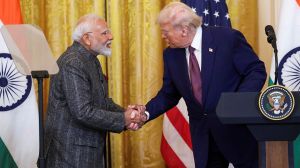JNPT146;s decongested, but bottlenecks emerge
The port congestion at Jawaharlal Nehru Port JNP, Nhava Sheva, seems to have reduced somewhat, but almost immediately another set of bottl...

The port congestion at Jawaharlal Nehru Port JNP, Nhava Sheva, seems to have reduced somewhat, but almost immediately another set of bottlenecks have sprung up.
Importers and exporters now have to deal with exorbitant transaction cost. And, of course, the emerging congestion at government-owned warehouses due to labour strikes and poor infrastructure.
The decongestion exercise 8212; traders and port operators mark it as a temporary situation 8212; has resulted in the release of about 8,000 import containers from the port terminal, movement of export cargo and reduction of transport queues outside the port gates.
The release of import cargo from the port to warehouses was initiated from the second week of October, thanks to a series of task-force meetings convened by the commerce ministry. The Central Warehousing Corporation8217;s CWC container freight station CFS was chosen due to its vicinity to the port and additional space. But this is where the cookie breaks.
The transportation for one container from the port to the CFS costs Rs 2,500 today. A steep hike, considering the normal charge was Rs 800 per container. Also, some CFS have jacked up their charges by about Rs 1,600 for import container storage.
8216;8216;The evacuation of containers has now resulted in increase in costs 8212; both transportation and CFS charges. The delivery is not smooth and the trade is getting affected due to labour strikes and shortage of equipment at CFS to handle the cargo,8217;8217; said R Radhakrishnan, president of Bombay Customs House Agents Association BCHAA
When contacted, Santok Singh, regional manager for CWC refuted any problems of congestion. 8216;8216;In the last few days, they had to handle around 4,000 containers. Obviously, there will be temporary break-downs due to such steep rise in numbers.8217;8217;
According to the labourers at CWC, equipment is now running beyond their capacity and will breakdown soon. Some of them are borrowed from the port authorities as Ornate, the outsourced agency which handles them, has reduced its operation due to wages and other labour problems.
8216;8216;The equipment is borrowed from NSICT and hired from other players due to the ongoing problem. But all of this is temporary,8217;8217; stated an official at CWC in JNP. A potential labour strike is another looming factor which cannot be ignored. A labourer who didn8217;t want to be named said, 8216;8216;We are supposed to get our bonuses on November 1. The unions have decided if we do not get our issues answered and well-deserved bonus, we are going to go on strike from November 2.8217;8217;
With all of these problems on a rise, the decongestion might just be a shortlived phenomenon.
The cargo congestion at JNPT, India8217;s leading container-handling port, had blocked trade worth Rs 5,000 crore. The situation got accentuated when the private terminal, Nhava Sheva International Container Terminal NSICT, closed the port gates due to increase in capacity 8212; NSICT handled 12.3 lakh TEUs of containers in 2003-04, double of its minimum commitment in 2004-05.
- 01
- 02
- 03
- 04
- 05































